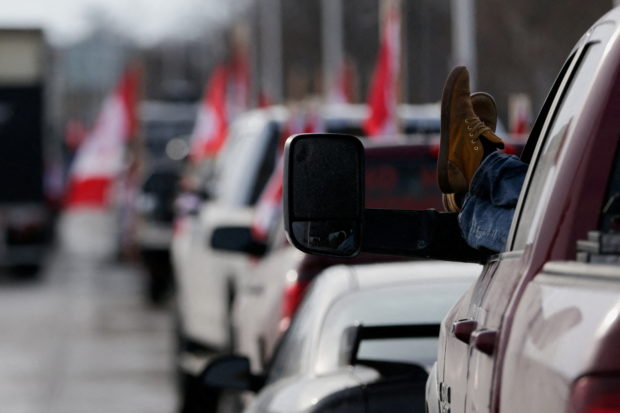US and Canada fear economic damage from border crossing protest

Vehicles block the route leading from the Ambassador Bridge, linking Detroit and Windsor, as truckers and their supporters continue to protest against the coronavirus disease (COVID-19) vaccine mandates, in Windsor, Ontario, Canada February 9, 2022. REUTERS/Carlos Osorio
WINDSOR/OTTAWA/WASHINGTON — Truckers blocking US-Canada border crossings risk hurting the auto industry and agriculture, the White House said on Wednesday as Ottawa urged an end to the 13-day demonstration against coronavirus mandates.
After nearly two years of pandemic measures in many countries, opposition has sprung up in different ways with copycat protests in Australia, New Zealand, and France as the highly infectious Omicron variant begins to ease in many countries.
Horn-blaring protests have been causing gridlock in the capital Ottawa since late January and from Monday night, truckers shut inbound Canada traffic at the Ambassador Bridge, a supply route for Detroit’s carmakers and agricultural products.
Another border crossing, in Alberta province, has been closed in both directions since late on Tuesday.
Starting as a “Freedom Convoy” occupying downtown Ottawa opposing a vaccinate-or-quarantine mandate for cross-border truckers mirrored by the United States government, protesters have also aired grievances about a carbon tax and other legislation.
Article continues after this advertisement“I think it’s important for everyone in Canada and the United States to understand what the impact of this blockage is – potential impact – on workers, on the supply chain, and that is where we’re most focused,” White House spokesperson Jen Psaki said on Wednesday.
Article continues after this advertisement“We’re also looking to track potential disruptions to U.S. agricultural exports from Michigan into Canada.”
Washington is working with authorities across the border to reroute traffic to the Blue Water Bridge, which links Port Huron in Michigan with Sarnia in Ontario, amid worries protests could turn violent, she told reporters.
Bank of Canada Governor Tiff Macklem called for a swift resolution.
“If there were to be prolonged blockages at key entry points into Canada that could start to have a measurable impact on economic activity,” he said.
“We’ve already got a strained global supply chain. We don’t need this.”
Protests spread
The protests were disrupting jobs too and “must end before further damage occurs,” Canada’s Emergency Preparedness Minister, Bill Blair, told reporters.
The bridge closure has already caused a shortage of parts at carmaker Stellantis’ assembly plant in Windsor, Ontario.
The company said it had to end shifts early on Tuesday, but the plant was able to resume production Wednesday morning.
The auto industry is also struggling with a lack of semiconductor chips worldwide.
Protesters say they are peaceful, but some Ottawa residents have said they were attacked and harassed. In Toronto, streets were being blocked.
“We continue to know that science and public health rules and guidance is the best way to this pandemic is the way we’re going to get to the other side,” said Prime Minister Justin Trudeau.
The issue has caused a sharp split between the ruling Liberals and the opposition Conservatives, many of whom have expressed open support for the protesters in Ottawa and accuse Trudeau of using mandates issue for political purposes.
Downtown residents criticized police for their initially permissive attitude toward the blockade, but authorities began trying to take back control Sunday night with the seizure of thousands of liters of fuel and the removal of an oil tanker truck.
Police have asked for reinforcements – both officers and people with legal expertise in insurance and licensing – suggesting intentions to pursue enforcement through commercial vehicle licenses.
But as the authorities attempt to quell demonstrations in one area, they pop up elsewhere.
“Even as we have made some headway in Ottawa, we’ve seen an illegal blockade emerge in Windsor,” said Public Safety Minister Marco Mendicino.
RELATED STORIES
Canadian authorities scramble to end protests vs. COVID measures
Canada, US business groups call for end to trucker trade route blockade
Canada resists pressure to drop vaccine mandate for cross-border truckers
For more news about the novel coronavirus click here.
What you need to know about Coronavirus.
For more information on COVID-19, call the DOH Hotline: (02) 86517800 local 1149/1150.
The Inquirer Foundation supports our healthcare frontliners and is still accepting cash donations to be deposited at Banco de Oro (BDO) current account #007960018860 or donate through PayMaya using this link.